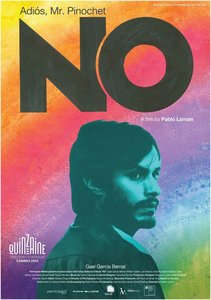No (2012 film)
| No | |
|---|---|

Theatrical release poster
|
|
| Directed by | Pablo Larraín |
| Produced by |
|
| Screenplay by | Pedro Peirano |
| Based on |
El Plebiscito by Antonio Skármeta |
| Starring | Gael García Bernal |
| Music by | Carlos Cabezas |
| Cinematography | Sergio Armstrong |
| Edited by | Andrea Chignoli |
|
Production
company |
|
| Distributed by | Sony Pictures Classics (US) |
|
Release date
|
|
|
Running time
|
118 minutes |
| Country |
|
| Language | Spanish |
| Box office | $7.7 million |
No is a 2012 internationally co-produced drama film directed by Pablo Larraín. The film is based on the unpublished play El Plebiscito, written by Antonio Skármeta. Mexican actor Gael García Bernal plays René, an in-demand advertising man working in Chile in the late 1980s. The film captures the historical moment of advertising tactics in political campaigns as in the 1988 plebiscite, when the Chilean citizenry decided whether or not dictator Augusto Pinochet should stay in power for another eight years.
At the 85th Academy Awards the film was nominated for the Best Foreign Language Film Oscar.
After fifteen years of military dictatorship and facing considerable international pressure, Chile's government asks the public of Chile to vote in the national plebiscite of 1988 on whether General Augusto Pinochet should stay in power for another eight years, or there should be an open democratic presidential election the following year.
René Saavedra, a successful advertisement creator, is approached by the "No" side to consult on their proposed advertising. Behind the back of his politically conservative boss, Saavedra agrees to participate and finds that the advertising is a dourly unappealing litany of the regime's abuses created by an organization that has no confidence in its efforts. Enticed by the marketing challenge, and his own loathing of Pinochet's tyranny, he proposes to the advertising subcommittee that they take a lighthearted, upbeat promotional approach stressing abstract concepts like "happiness" to challenge concerns that voting in a referendum under a notoriously brutal military junta would be politically meaningless and dangerous.
While the unorthodox marketing theme is dismissed by some "No" members as a facile dismissal of the regime's horrific abuses, the proposal is approved for the campaign. Saavedra, his son and his comrades are eventually targeted and intimidated by the authorities. Eventually, Saavedra's boss Lucho finds out about his employee's activities, but when Saavedra refuses an offer to become a partner if he withdraws, Lucho goes to head the "Yes" campaign as a matter of survival.
...
Wikipedia
